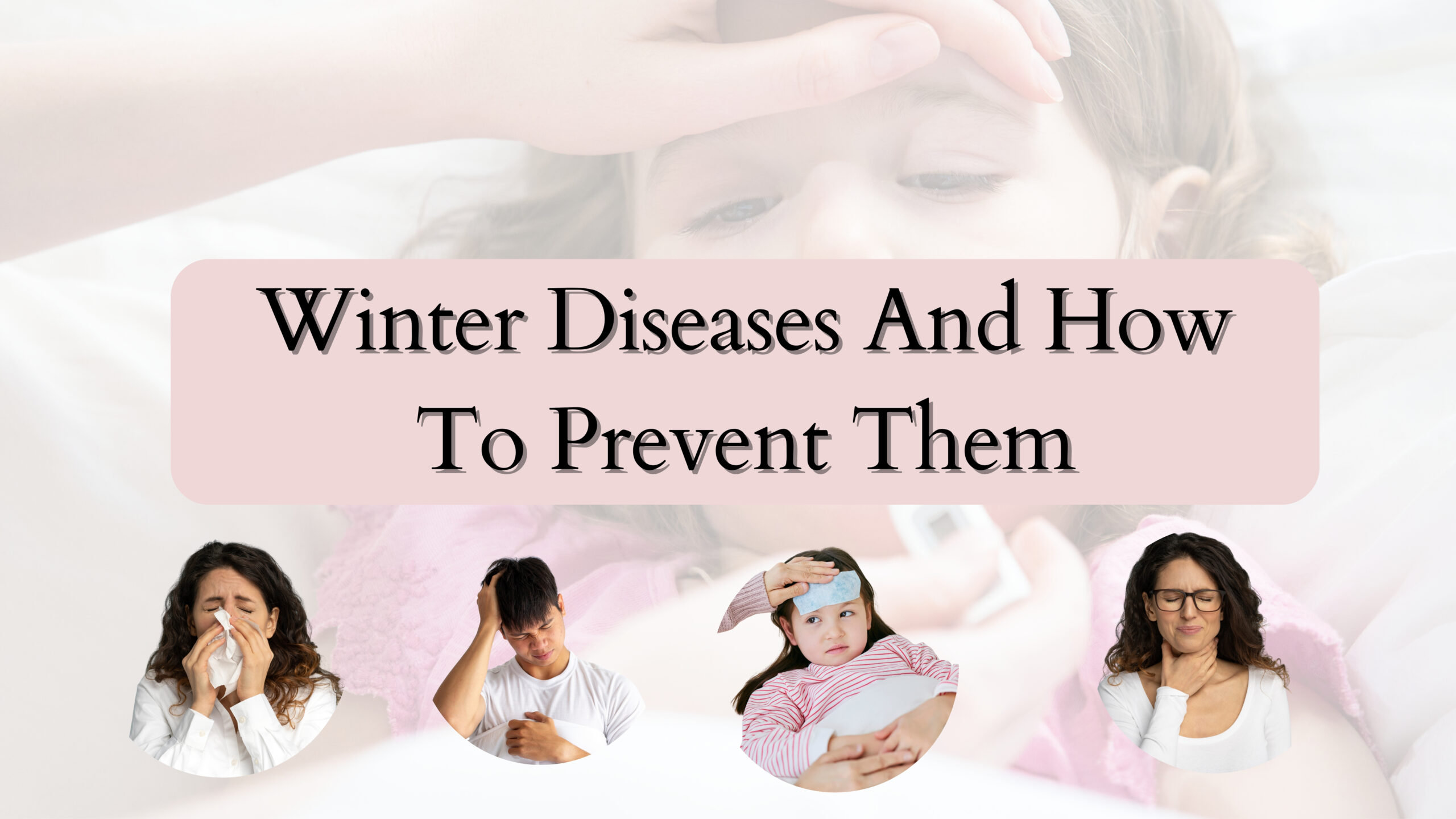Subtotal $0.00
Common winter diseases also come with a sense of celebration, nestling, and all things warm and delicious. But what you may not realize is that the cold also puts you at risk for other infections, too. A chilly dip in temperature and more time indoors is the perfect storm for cold weather-related illnesses, such as colds, the flu, and respiratory woes.
In this post, we will discuss some of the health issues that are widespread in Indian winters and their symptoms, as well as how we can deal with them or even eliminate them.
Common Cold
The common cold is the most common winter illness. It is commonly caused by viruses such as rhinoviruses and is easily transmitted through droplets.
Symptoms:
- Runny or stuffy nose
- Cough and sore throat
- Sneezing
- Mild headache
- Low-grade fever
Prevention and Care:
- Get plenty of rest
- Stay hydrated.
- Take decongestants or do saline nasal rinses.
- Relieve congestion with a humidifier.
Flu (Influenza)
Compared with the common cold, the winter flu is both more severe and more enduring. This has led to the question being asked, “Why do we get colds and flu in winter?” It’s because cold weakens natural immunity, and viruses do well in dry air.
At-risk groups:
- Children under 5
- Adults above 65
- Pregnant women
- People with chronic illnesses
Symptoms:
- High fever
- Body aches
- Fatigue
- Persistent cough
Tip: By far, the best way to avoid getting the flu is to get vaccinated against it every year.
Strep Throat
A bacterial infection that tends to circulate in the winter.
Symptoms:
- Sudden throat pain, painful swallowing
- Red, swollen tonsils covered with white patches
- Fever and headache
- Swollen lymph nodes
- Avoid sharing utensils
Prevention:
- Sneeze into your mouth and nose.
- Visit a doctor and get antibiotics if necessary.
Ear Infections
The cold season causes respiratory congestion, but children are mostly at the risk of developing middle ear infections.
Symptoms:
- Fever
- Ear discharge (pus or blood)
- Severe earache
Prevention:
- Keep ears dry and warm
- Treat colds promptly
- If the pain endures, see a doctor
Sinusitis
Sinus issues can worsen in the dry air of winter.
Symptoms:
- Facial pain and pressure
- Stuffed nose
- Headache
- Post-nasal drip
Prevention:
- Use humidifiers
- Stay hydrated.
- Wash hands frequently
Joint Pains
Cold conditions cause decreased blood flow, resulting in stiff and swollen joints.
Tips for Relief:
- Wear warm clothing.
- Applying hot water bags or heating pads.
- Stay active indoors
Respiratory Ailments
Certain cold weather illnesses can be serious:
- Bronchial opening and constriction
- Breathing out lung inflammation The effect on airflow
- Reaction to cold Asthma flare-ups
- An allergic reaction or an attack of asthma begins in the lungs when something harms them.
- Bronchitis: An inflammation of air passages causing coughing and mucus
- Pneumonia Bacterial or viral lung infection with high fever, chest pains, and shortness of breath
Seasonal Depression (SAD)
It’s sometimes called “winter blues” because it involves mood and energy.
Symptoms:
- Fatigue and oversleeping
- Difficulty concentrating
- Increased appetite and weight gain
- Low mood or withdrawal
Tips:
- Get sunlight exposure
- Exercise regularly
- Get professional help if your symptoms are getting worse.
Heart Attacks in Winter
And cold weather can make the heart work harder, increasing the risk of heart attacks and elevating blood pressure, which can be dangerous.
Prevention:
- Stay physically active
- Eat a heart-healthy diet
Schedule annual health screenings
Healthy Tip: Stay Healthy This Winter With These Quick Tips
- Eat a balanced, nutrient-rich diet
- Exercise daily, even indoors.
- Drink enough water
- Dress appropriately for the cold
- Sleep well and manage stress
- Maintain good personal hygiene
- Remember your mental health, and take care of yourselves.
Concluding
Winter is certainly fun but also a season that is crucial to health. Stay ahead in combating winter diseases in India. Adopt hygienic practices, keep warm, and when necessary, consult your doctor. If you have severe winter sickness symptoms, such as very high fever, difficulty breathing, or chest pain, seek medical advice immediately.



